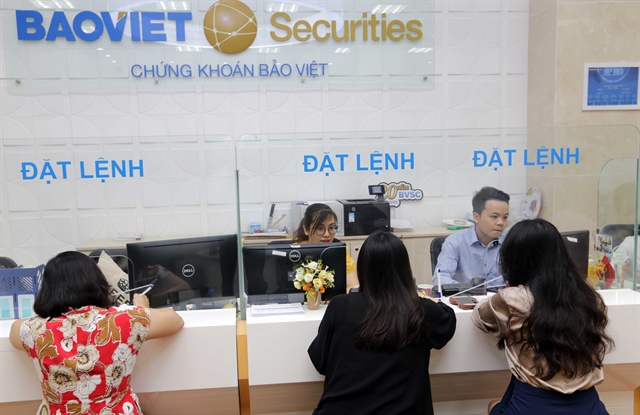 Economy
Economy

SSC continues to step up inspection and strictly handle violations while coordinating with international organisations to upgrade the stock market soon to attract foreign investors.

|
| Investors performing transactions at an office of Bảo Việt Securities Company in Hà Nội. VNA/VNS Photo |
HÀ NỘI — Despite turbulence in the first few months of 2023, the Vietnamese stock market still has opportunities to recover and develop steadily in the future, Phạm Hồng Sơn, vice chairman of the State Securities Commission (SSC), said at a press conference.
The leader of SSC said that the strong fluctuations of the market in the first quarter were due to the influence of many international and domestic macro factors.
Due to inflationary pressures and a potential economic recession, global central banks accelerated tightening monetary policies.
Moreover, the consecutive collapse of three banks in the US and then the Swiss bank Credit Suisse in the first weeks of March spurred worry among investors about the safety of financial markets.
With these developments, both the Vietnamese stock market and global markets fluctuated strongly toward a downtrend.
Although the economy is still recovering at home, several challenges, including the high-interest rate environment and liquidity issues in the real estate and corporate bond markets, are hurting the confidence of domestic investors.
However, supportive policies to ease business challenges brought some good news to the Vietnamese stock market at the end of the first quarter.
These policies included Decree No.08/2023/N-CP on amending, supplementing, and suspending the effect of several articles in the Decrees on the offering and trading of private corporate bonds in the domestic market and offering corporate bonds to the international market and Resolution No.33/NQ-CP on solutions to remove difficulties and promote the safe, healthy, and sustainable development of the real estate market.
Public investment disbursements and lower operating interest rates also lifted the market sentiment.
Thanks to the positive news, the domestic stock market logged the longest winning streak since August 2021.
By the end of March, the market capitalisation of the three stock exchanges reached nearly VNĐ5.4 quadrillion (US$230.3 billion), an increase of more than 3.3 per cent compared to the end of 2022 and equivalent to 56.7 per cent of the estimated 2022's GDP, according to Sơn.
The market liquidity, however, remained low in the first quarter of 2023, with an average trading value of about VNĐ11.3 trillion per session.
In contrast, foreign investors have been very active during the period as they net bought about VNĐ7 trillion of shares and fund certificates. The return on foreign capital showed that the stock valuation is attractive for foreign investors' medium and long-term investment strategies.
The SSC's leader added that the stock market's movements in the future still largely depend on international and domestic macroeconomic policies and economic prospects.
Even though the trend of interest rate hikes has shown signs of slowing, the global economy is still forecast to face many challenges and uncertainties. Domestically, the country's economy grew in the first quarter, but it showed a deceleration while the health of listed companies was also affected by the post-COVID-19 period.
Nevertheless, compared to many countries in the world, the country's economy still has many bright spots. Many international organisations still highly appreciate the results and prospects of the Vietnamese economy's future development, said Sơn.
The vice chairman of SSC expected the Government's initiatives to ease restrictions on the corporate bond and real estate markets, promote public investment, and cut lending interest rates would benefit the nation's economy, stimulating production and business activities.
Also, the stock market's price-to-earnings ratio (P/E) is at 11 times, which is regarded as a favourable level and lower than most markets worldwide.
"All of the above factors suggest that the Vietnamese stock market still has growth potential in the medium and long term," Sơn said.
To further support the market, Sơn said that SSC is currently reviewing the provisions of the Securities Law and guiding documents to solve problems immediately, ensuring the stock market's healthy, transparent, and sustainable development.
It is also speeding up the process of implementing a new information technology system and promoting restructuring of the stock market.
Amid uncertainties, SSC will continue to closely watch economic developments in general and the stock market, in particular, to develop appropriate and timely solutions proactively.
On the other hand, the commission continues to step up inspection and strictly handle violations while coordinating with international organisations to upgrade the stock market soon to attract foreign investors. — VNS




